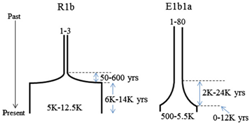
A recent study published in Investigative Genetics has shown that the genetic lineage of most Western Europeans started from just one to three men, sparking many and varied online discussions.
The study, led by Chris Tyler-Smith, involved producing a model to investigate the expansion of Neolithic genetic lineages throughout Africa and Europe. Both Africa and Western Europe have a predominant genetic lineage, or haplogroup, and genetic and archaeological evidence show that both of these haplogroups expanded in their respective populations during the Neolithic period (from about 10,000BC to 3000BC).
The haplogroups investigated in this study are variations of the Y chromosome, only present in men. Using advanced sequencing tools it was therefore possible to produce a model of population expansion by fatherhood.
While the predominant African haplotype (E1b1a ) shows an expansion starting from approximately 40 men over about 12,000 years, the European haplotype (R1b) shows rapid expansion over a few generations, starting from just one to three men.

BioMed Central’s online magazine Biome spoke to Chris Tyler-Smith to get his take on what the article is telling us. When asked about why the population in Europe may have expanded so rapidly, he suggested that: “In Europe, the starting number of farmers may have been smaller, so there were fewer Y lineages. And the farming package, perhaps including several different crops and domesticated animals, may have been well-suited to the environment, so the farmers could increase rapidly in number.”
These fascinating findings have been a big topic of online discussion. Hotspots for this include the popular Dienekes’ Anthropology Blog and the online forum Slashdot, with conversation threads ranging from the technical ins and outs of the method to whether or not the article backs up the Bible story of Noah and the flood. While we couldn’t possibly comment on this, it’s great to see that this research has prompted such lively debate.
You can read the full, open access article and sign up for our article alerts on the Investigative Genetics website, where you can also submit a manuscript.
- Raising funds for genetic diseases - 23rd September 2016
- The Epigenetics and Chromatin Clinic - 9th November 2015
- Resurrecting one of the oldest genetics journals - 23rd October 2015
Comments